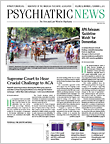The recommendations made in APA’s Practice Guideline for the Treatment of Patients With Alzheimer’s Disease and Other Dementias, originally issued in 2007, remain substantially correct and can still be regarded as current by clinicians, reported the authors of the recently published “guideline watch” that reviewed the latest clinical findings in this field.
New studies published since the 2007 dementia guideline do change the strength of the evidence supporting some of the recommendations, but none of the findings would lead to significant changes in the types of approaches—both pharmacological and psychosocial—used to treat the cognitive and behavioral symptoms of dementia.
However, the research presented in the guideline watch does offer new insights for therapists and clinicians, said Laura Fochtmann, M.D., a professor of psychiatry at Stony Brook School of Medicine and APA’s medical editor for practice guidelines.
“While there are no dramatic changes on a broad level, the new data have better defined the risks and adverse effects of many drugs, so we have more knowledge to help make better decisions for individual patients,” she told Psychiatric News.
One particular topic Fochtmann cited was the section related to the use of antipsychotic drugs for psychosis symptoms and agitation. The Food and Drug Administration (FDA) had issued black-box warnings for second-generation antipsychotics related to the risks of death in elderly dementia patients as APA’s practice guideline was being compiled and then added the warnings for first-generation antipsychotics in 2008 (Psychiatric News, May 2005; July 2008).
Clinical studies published since those warnings have found that for many patients, antipsychotics can be tapered and discontinued without significant signs of withdrawal or a return of behavioral problems. These new observations strengthen the 2007 recommendation that physicians discontinue antipsychotic medications in dementia patients whenever possible.
Also, as in the 2007 guideline, the guideline watch emphasizes the importance of addressing potential underlying causes for agitation and trying environmental measures, including reassurance and redirection to treat agitation prior to beginning pharmacotherapy.
As for other drugs that might treat behavioral problems in dementia, a clinical trial involving the antidepressant citalopram found that it did reduce agitation in Alzheimer’s patients, but cognitive and cardiac side effects may limit its therapeutic use.
For the cognitive-related aspects of Alzheimer’s treatment, the review found that evidence for cholinesterase inhibitors and memantine—the two FDA-approved drugs for memory loss—remains modest. The review also highlighted recent trials that used these two drugs in combination and found that they provided, at best, slight benefits to memory.
These findings are timely, as this past December, the FDA did approve Namzaric, a combination of extended-release memantine and the cholinesterase inhibitor donepezil, to treat moderate to severe Alzheimer’s (Psychiatric News Alert, December 29, 2014).
The updates were not confined to drug treatments, however. The guideline watch presented additional evidence confirming that psychosocial interventions improve or maintain cognition, function, adaptive behavior, and quality of life with effect sizes that are comparable to pharmacological interventions.
The 2014 Guideline Watch: Practice Guideline for the Treatment of Patients With Alzheimer’s Disease and Other Dementias was developed between July 2012 and September 2014. Development of the watch involved a thorough literature search that netted more than 750 articles published from 2002 to 2014, which were reviewed by the watch authors.
As with other guideline watch publications, these Alzheimer’s updates were written and reviewed by an expert panel and approved for publication by APA’s Executive Committee on Practice Guidelines. Thus, the watches represent the opinion of the authors and have the approval of the Executive Committee but do not constitute official APA policy.
The members of the expert panel for the Alzheimer’s Guideline Watch consisted of Peter Rabins, M.D., M.P.H., Barry Rovner, M.D., Teresa Rummans, M.D., Lon Schneider, M.D., and Pierre Tariot, M.D. ■
The 2014 Guideline Watch for the Treatment of Patients With Alzheimer’s Disease and Other Dementias can be accessed
here.
